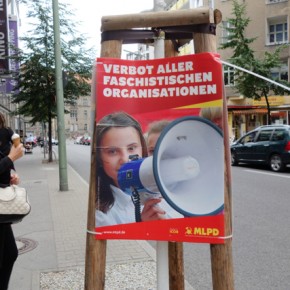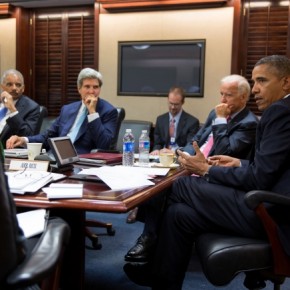On Monday, it will be Labor Day, a major holiday in the United States. Except for a few pithy Facebook posts or bumper stickers, I don’t expect to see an actual celebration of labor, much less the labor movement, which is edging closer every day to extinction. And yet, in 2013, the economic condition of American workers is worse than at any time since the Great Depression.
Noam Chomsky said, in an interview last year, that the major problem facing people is joblessness. That’s hardly news, but it’s an important statement coming from someone viewed as such an intellectual leader of the American left. With so much domestic activism focused on foreign policy, LGBT rights, racism, reproductive rights and so many other issues that are of grave importance, it can be easy to forget the importance of unemployment, which cuts across so many of the other issues and unites people across all sorts of social barriers.
People need work; we need something to do. More obviously, people need an income and a decent wage. On August 29th, workers at fast food outlets in some 50 cities across the United States went on strike to demand a living wage. They called for a minimum wage of $15 per hour, well above President Barack Obama’s pathetically controversial proposal to raise it to a mere $9. Even in a market economy gone off the deep end, like the bizarre version of capitalism that operates in the United States, people who work hard at miserable jobs ought to at least earn enough to support themselves.
The minimum wage reached its peak, in terms of inflation adjusted dollars (the scale used is 1996 dollars) in 1969, when its value was $6.84. In 2012, it was $4.97. Clearly, the minimum wage has not kept up, and this despite the fact that, even after adjusting according to the Consumer Price Index, people have more expenses today than they did in 1969. Obama’s proposal would have brought the minimum wage back up to about $6.17. An improvement, had he ever followed through, but not that much of one. And soon enough, it would erode again. Workers are proposing a figure that would be a bit over $10 per hour, in 1996 dollars. Hardly a king’s ransom, especially considering the hard work they do in such miserable conditions. I worked in McDonald’s in my youth. I know how awful it is.
The inability to make ends meet on the minimum wage is only one part of the problem. While recent job reports seem to indicate that jobs are starting to become available again, most of the jobs being added are at or near minimum wage, and as many as 75% are part-time. Getting a low-paying part-time job takes a worker out of the unemployment figures, but it doesn’t put food on the table.
My own story is that of one of the more fortunate people among the long term unemployed. Since June of 2010, I have been fruitlessly searching for a job, after years of working as a professional and at a salary that put me squarely in the middle class. Unable to find a job, I went to school, funded entirely by loans, in part to enhance my job prospects and in part so the loans, which now have me in crushing, six-figure debt, could sustain me for a while. But my spouse does work, and I have support from a parent who is in a position to do so. So, while some bills go unpaid for too long, we always get the rent paid, we have enough food and basic expenses and we get by.
But even in that, the stress can be overwhelming. Not just the financial stress, which is bad enough. The loss of confidence and self-esteem that comes with long term unemployment is crushing. My experience is widely shared. In my mid-40s, I am a burden to a parent who should not have to be supporting me anymore; I am a burden to my spouse, who works hard and, because I can’t find work, is still unable to make ends meet; and of course, there is the terrible feeling of guilt that comes with being unable to support my child. And, I stress, I am in a far better situation than most of the long-term unemployed.

The unemployed, the underemployed, people working full time who still don’t earn enough to support themselves, the many people desperately grabbing part time jobs with no benefits because they have no other choice…all of these people, when added together, represent a disturbingly large portion of our citizenry, even before we get into the issue of non-citizens. And, while all of these situations have certainly been exacerbated by the economic downturn, these are long term trends, over the course of numerous decades.
It is no coincidence that in 2013, the percentage of private sector, non-agricultural workers who belong to unions is 7%. In 2003, that figure was 12.1%. In 1945, it was at its peak, at 35.4%. Not coincidentally, in 1947, the Taft-Hartley Act was passed into law to amend the 1935 National Labor Relations Act (NLRA), which guaranteed workers the right to organize. When Republicans failed to get the NLRA ruled unconstitutional, they crafted many bills to beat back the power of labor unions. Taft-Hartley was their great success, and it began decades of discrediting, disempowering, corrupting and co-opting unions in the United States.

No doubt, the history of labor unions in the United States is sadly stained by corruption, lack of vision, criminality and betrayal of workers’ interests. The proper response, however, was not to abandon the notion of collective action and bargaining, but to fix the union system. It’s easy to see why this is so crucial, even without getting anywhere near a Marxist analysis, though we could use more of such thinking.
Just look, for example, at the reasoning offered widely by the business community and the business press for why employers are hiring more part-time workers: they do not want to provide health insurance for their employees. In fact, this is a perfectly logical and rational choice for businesses to make. With no risk involved in treating their workers poorly, and no downside to viewing workers as replaceable commodities, why should they incur an extra expense when there is an alternative?
Even a more humane business, which might believe that it is right that employers provide health care to their employees, has to consider the environment they operate in. After all, even if they can still compete in the market with companies staffed largely by part-timers, they would be lowering their profitability by paying for health care and other benefits. This drives their stock values down, scares away potential investors and makes the company lose still more money. This is a real factor; a study done recently showed that profit per employee at privately held companies jumped to more than $18,000 in 2012 from about $14,000 in 2009. This was due to demanding more of workers and paying them less. That includes the cost of health care.
The only way this can be combated is by workers coming together and organizing. But the very word “union” has become an epithet among working Americans. Consider the events last year in Wisconsin, where government employees’ unions came under fire. While initially seen as mean-spirited, Scott Walker’s assault on unions gained sympathy as many in Wisconsin responded to the fact that government employees enjoyed collectively bargained benefits and better wages not by recognizing that they should follow that example, but with resentment against workers who were still quite far from wealthy people.
I am again struck by several incidents during the wave of Occupy protests, where I saw signs that apologetically insisted that the protesters were not advocating “socialism.” The extremism on issues of workers’, and any sort of collective rights that the right has fomented (the notion that Obamacare, a very friendly system to insurance and pharmaceutical companies that offers only a little change for people struggling under the insanity of a health-care system primarily set up for profit rather than for health) has seeped deeply into liberal circles. The idea of being a “socialist” conjures up massive fear.
Some aspects of socialism offer reasonable solutions that can be pursued even within the parameters of a market economy. At least they can in the kind of market envisioned by such “commies” as Adam Smith or John Maynard Keynes, which has very little, if any, connection to the mad capitalism of the American system, where government action is treated as anathema unless it is to give handouts to the super-wealthy. In that instance, let Big Government reign!
But this isn’t about socialism, capitalism or any other ism. It’s about people having the means to sustain themselves. There are far too many of us out here not working, who desperately want to work and bring home an honest day’s pay. That’s supposed to be the American ideal, and a founding principle. It’s not, and it never was. Maybe if we started treating Labor Day as something other than an excuse for a barbecue, it could be.
Photographs courtesy of Joel Schalit





